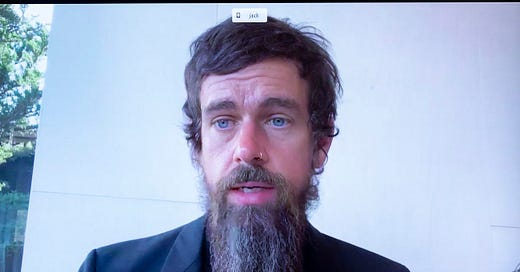
Decentralization Isn't the Answer ... (Yet)
Jack Dorsey published a statement yesterday on Twitter, in which he publicly acknowledges Trump’s Twitter ban, and gives some of his personal insight on the decision.
Personally, I think it was a noble and eloquent statement by Jack Dorsey. He gives transparency to some of the choices that have enormous impact on our society and on the hearts and minds of the people.
To read Jack’s entire statement, click here…
For the sake of todays’ newsletter, there is a section we need to highlight, as it touches on some talking points of decentralization, which are critical to understand.

Over time, there’s no reason to think the internet won’t move towards decentralization. It’s the inevitable next step in evolution of the internet.
My argument in this article is that the concept of decentralization is too far out for us to take seriously, and in many cases, “centralizing” the internet is the better short term solution.
First, we need to address the real problem. You ready??? Here’s the problem.
No one has a clue what they are doing.
When our constitution was written, the founding fathers never accounted for the fact that technology companies would be able to create systems of leverage in which one person would have the ability to instantly communicate with millions of people.
The First Amendment does not apply to private companies (meaning that if a private company wants to ban a president, they have every right to do so). However, The First Amendment does give people the “right to assemble.”
You have to understand that in the 1770’s, if you had a message you wanted to share with the public, it meant you would have to assemble people and stand on a soapbox and deliver your message.
Today’s equivalent of “assembling” is to build a social media following, as most of our societal dialogue happens on the state of social commenting. So the First Amendment argument against banning people from Twitter does apply, and it also doesn’t.
These are very difficult constructs to navigate. How on earth does a private company make a decision like this? No matter what they do, they are right and they are also wrong, both within the public discourse and within the constraints of the law.
…No one has a clue what they are doing.
So getting back to the point of decentralization, it’s a natural inclination for tech oligarchs to spread the idea of decentralization because it takes the responsibility of these decisions off of private companies and puts it onto an anonymous ledger in which no single person is in charge.
Sounds great. Utopian even. But it’s naïve and will serve us no utility in the current moment.
What we need is actually the opposite. We need a centralized system that can create rules and regulations (let’s call them laws) on how our society is allowed to operate and interact on the internet.
An “internet court” would take difficult concepts like online free speech and the right to assemble, and put them in the court of law where they actually belong.
In addition, there are many reasons to think that decentralizing social content hubs will not work out from a logistical standpoint. The main mechanism for success of social media is the algorithmic nature in which they operate. Algorithms write “if this, then that” statements to make social media an enjoyable experience for you.
On one side, the algorithm’s are responsible for creating echo chambers, but they are also responsible for making social media enjoyable for the end user. Of course we want to be served content that we enjoy and agree with.
A decentralized content hub will most likely create a user experience in which the content is just as random as the people who are in it. In addition, there’s no internal or external incentive to make these content hubs profitable, which means there’s no incentive for advertisers (or anyone for that matter), to participate in the dialogue.
There’s no leverage.
It’s only natural to think that somehow, someway, decentralization will play a major role in our societal norms. Decentralization very well could be the future, and I’m excited to see what this looks like. I’m not arguing against the idea of decentralized work flow. What I’m saying is this is at the very least, a futuristic idea.
We’re living in the right now.
Right here right now, we need the opposite.
There needs to be rules and accountability that stretch outside of private “Terms of Service.”
We need to centralize the laws of the internet.
P.S. - One last note
I see lots of language on Twitter about the evils of centralization, as if anything the government does is infringing on our rights. As people, we have very short term memories, and I find this language to be entitled.
Let’s not forget that the centralization of work, money, labor laws, and more was exactly what contributed to the 1950’s economic boom of our country. In addition to winning the war, FDR created an entire network of legislation that centralizes laws, unionized workers, and created the largest most successful middle class in the history of the world.
It’s very easy to argue that the “deregulation movement” (started by Reagan and built upon by Clinton) is what lead to the debt bubble and the real estate crisis of 2008, and also what has led to the massive inequality of wealth in our country.
I don’t understand why people hate regulation and government so much, when regulation is what has already led to the largest middle class in history. Isn’t that what we all want?



